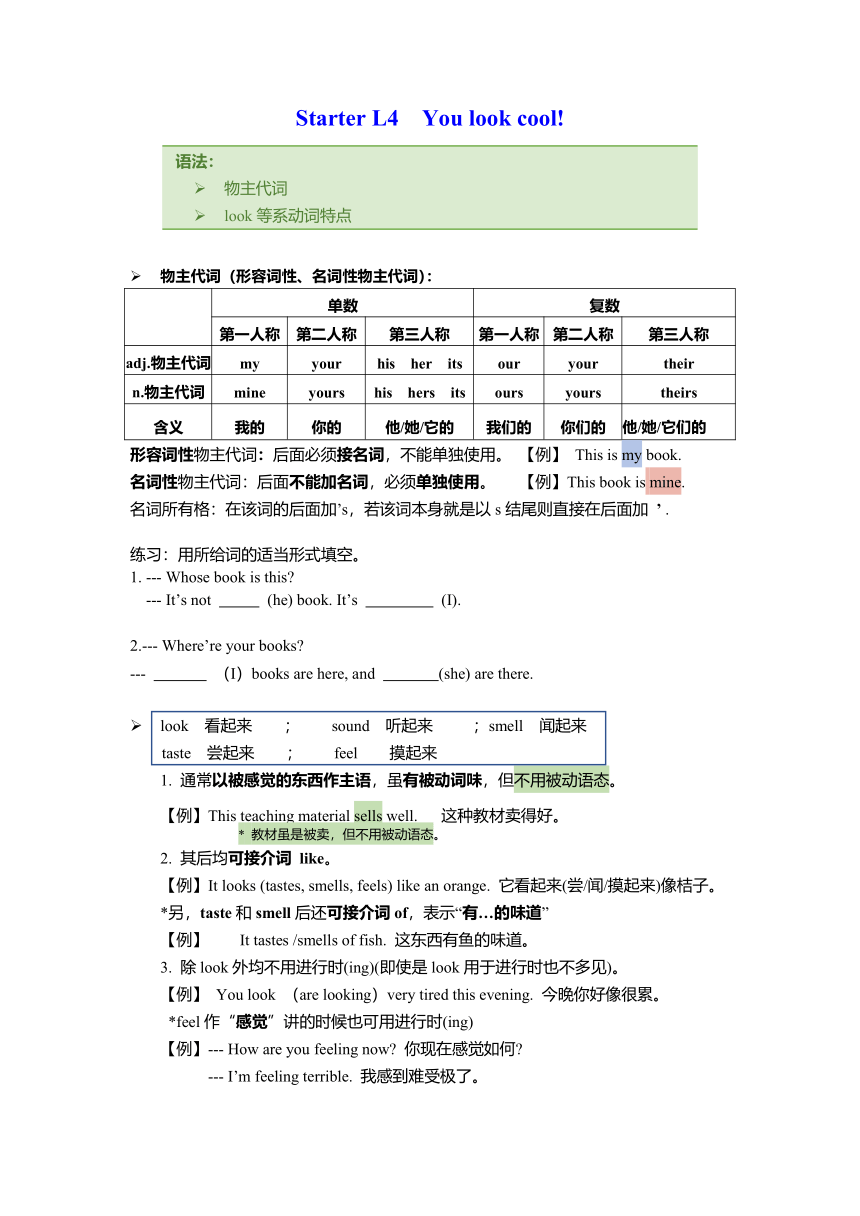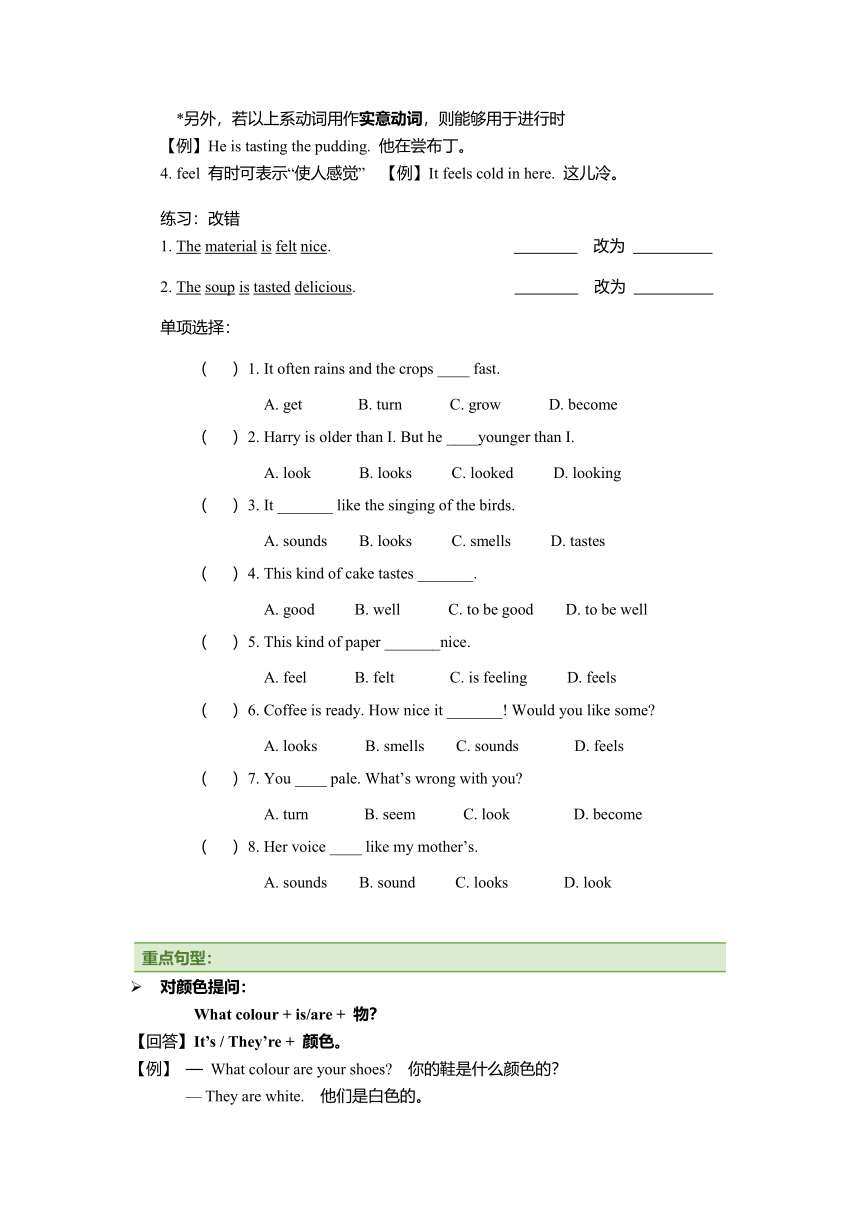牛津译林版英语预备课程 starter Lesson 4 You look cool ! 学案 (无答案)
文档属性
| 名称 | 牛津译林版英语预备课程 starter Lesson 4 You look cool ! 学案 (无答案) |

|
|
| 格式 | docx | ||
| 文件大小 | 31.5KB | ||
| 资源类型 | 教案 | ||
| 版本资源 | 牛津译林版 | ||
| 科目 | 英语 | ||
| 更新时间 | 2021-09-23 00:00:00 | ||
图片预览


文档简介
Starter
L4
You
look
cool!
语法:
物主代词
look等系动词特点
物主代词(形容词性、名词性物主代词):
单数
复数
第一人称
第二人称
第三人称
第一人称
第二人称
第三人称
adj.物主代词
my
your
his
her
its
our
your
their
n.物主代词
mine
yours
his
hers
its
ours
yours
theirs
含义
我的
你的
他/她/它的
我们的
你们的
他/她/它们的
形容词性物主代词:后面必须接名词,不能单独使用。
【例】
This
is
my
book.
名词性物主代词:后面不能加名词,必须单独使用。
【例】This
book
is
mine.
名词所有格:在该词的后面加’s,若该词本身就是以s结尾则直接在后面加
’
.
练习:用所给词的适当形式填空。
1.
---
Whose
book
is
this?
---
It’s
not
(he)
book.
It’s
(I).
2.---
Where’re
your
books?
---
(I)books
are
here,
and
(she)
are
there.
look
看起来
;
sound
听起来
;smell
闻起来
taste
尝起来
;
feel
摸起来
通常以被感觉的东西作主语,虽有被动词味,但不用被动语态。
【例】This
teaching
material
sells
well.
这种教材卖得好。
教材虽是被卖,但不用被动语态。
2.
其后均可接介词
like。
【例】It
looks
(tastes,
smells,
feels)
like
an
orange.
它看起来(尝/闻/摸起来)像桔子。
另,taste和smell后还可接介词of,表示“有…的味道”
【例】
It
tastes
/smells
of
fish.
这东西有鱼的味道。
3.
除look外均不用进行时(ing)(即使是look用于进行时也不多见)。
【例】
You
look
(are
looking)very
tired
this
evening.
今晚你好像很累。
feel作“感觉”讲的时候也可用进行时(ing)
【例】---
How
are
you
feeling
now?
你现在感觉如何?
---
I’m
feeling
terrible.
我感到难受极了。
另外,若以上系动词用作实意动词,则能够用于进行时
【例】He
is
tasting
the
pudding.
他在尝布丁。
4.
feel
有时可表示“使人感觉”
【例】It
feels
cold
in
here.
这儿冷。
练习:改错
1.
The
material
is
felt
nice.
改为
2.
The
soup
is
tasted
delicious.
改为
单项选择:
(
)1.
It
often
rains
and
the
crops
____
fast.
A.
get
B.
turn
C.
grow
D.
become
(
)2.
Harry
is
older
than
I.
But
he
____younger
than
I.
A.
look
B.
looks
C.
looked
D.
looking
(
)3.
It
_______
like
the
singing
of
the
birds.
A.
sounds
B.
looks
C.
smells
D.
tastes
(
)4.
This
kind
of
cake
tastes
_______.
A.
good
B.
well
C.
to
be
good
D.
to
be
well
(
)5.
This
kind
of
paper
_______nice.
A.
feel
B.
felt
C.
is
feeling
D.
feels
(
)6.
Coffee
is
ready.
How
nice
it
_______!
Would
you
like
some?
A.
looks
B.
smells
C.
sounds
D.
feels
(
)7.
You
____
pale.
What’s
wrong
with
you?
A.
turn
B.
seem
C.
look
D.
become
(
)8.
Her
voice
____
like
my
mother’s.
A.
sounds
B.
sound
C.
looks
D.
look
重点句型:
对颜色提问:
What
colour
+
is/are
+
物?
【回答】It’s
/
They’re
+
颜色。
【例】
—
What
colour
are
your
shoes?
你的鞋是什么颜色的?
—
They
are
white.
他们是白色的。
对物主代词或名词所有格(…….的)提问:
Whose
+
名词
+
be
+
…..?
【回答】It’s
/
They’re
+
Sb’s/物主代词
+
物.
【例】—
Whose
book
is
it?
这是谁的书?
It’s
Justin’s
book.
它是
Justin
的书。
询问对方有什么问题或不顺心的事情,表示“怎么啦”“出什么事啦”
What’s
wrong
(
with
sth/
sb)?
某人或某物怎么了?
【例】What’s
wrong
with
you?
你怎么了?
What’s
wrong
with
your
watch?
你的手表怎么啦?
询问某人的穿着外貌以及品质时,
外貌/内在性格
What
+
be
+
sb
+
like?
=
What
do/
dose
sb
look
like?
某人什么样?
仅指穿着外貌
【穿着】—
What
is
lucy
like?
Lucy
穿了什么衣服?
—
She
wears
an
orange
coat.
她穿了一件橙色外套。
【外貌】—
What’s
Judy’s
father
like?
Judy的爸爸长什么样?
—
He
is
big
and
tall.
他又高又大。
【品质】—
What
is
Miss
Gao
like?
高老师人怎么样?
—
She
is
kind
and
helpful.
她既善良又乐于助人。
【拓】what、how的其他相似句型
1.
What
does/do
sb
like?
某人喜欢什么?
【例】---
What
does
he
like?
---
He
likes
to
play
football.
2.
How
do/does
sb
like/find
sth?
=
What
do/does
sb
think
of
sth?
某人认为/觉得…怎么样?
【例】---
How
do
you
like
his
new
book?
=
What
do
you
think
of
his
new
book?
---
I
think
it’s
great
---
你觉得他的新书怎么样?
---
我觉得很棒。
用来询问某人或某物的信息或提出建议
What/how
about
…?
……怎么样呢?
已知一人/物的信息,询问其他人/物信息:
…呢?
【例】Her
father
is
a
driver.
What/
How
about
yours?
她的爸爸是一个司机,你的呢?
I
like
white.
What/
How
about
you?
我喜欢白色,你呢?
提出委婉建议:…怎么样呢?
【例】What/How
about
playing
football?
去踢足球怎么样?
We
need
to
do
some
shopping.
How/What
about
tomorrow?
我们该去买点东西了。明天去怎么样?
重点单词短语:
一些成双成对的名词通常只有复数形式,常见的:
jeans
牛仔裤
trousers裤子
pants短裤
clothes衣服
socks袜子
shoes
鞋子
glasses
眼镜
sunglasses太阳镜
headphones
头戴式耳机
scissors剪刀
compasses
圆规
这些名词可单独作主语,动词用复数形式,也可用量词…pair/pairs
of修饰,作主语时动词取决于量词pair单复。
put
away
放好
宾语是名词时,放在away后面;当宾语是人称代词时放中间
【例】Put
away
the
coat.
把这件衣服放好。
;
Put
it
away.
把它放好。
worry
使…
担心
【例】Don’t
worry.
不要担心
worry
about
…
担心…
【例】
worry
about
me.
担心我
stop
doing
sth
停止做某事(做了)
【例】She
stops
crying.
她停止哭。
stop
to
do
sth
停下来去做另一件事(未做)
【例】She
stops
to
cry.
她停下来,开始哭。
help
do
sth
帮忙做某事
【拓】help
sb
do
sth
帮助某人做某事
;
help
sb
with
sth
帮助某人某事
【例】She
helps
clean
the
classroom.
她帮忙打扫教室。
Mia
helps
Reece
learn
English.
Mia
helps
Reece
with
English.
Millie帮助Bob学习英语。
like
doing
/
to
do
喜欢做某事
【例】My
father
likes
playing
/
to
play
football.
我的爸爸喜欢踢足球。
【拓】like
doing和like
to
do都表示“喜欢做某事”,其中的区别如下:
●
like
doing
sth表示长时间的喜欢做某事。指兴趣爱好。
【例】I
like
watching
TV
.我喜欢看电视。
Do
you
like
singing?
你喜欢唱歌吗?
经常性的,爱好
She
likes
swimming。她喜欢游泳。
I
like
eating
fish
.
我喜欢吃鱼。
●
like
to
do
sth常指某个具体的动作,表示偶尔一次喜欢做某事、或者突然
想要干某事.
【例】She
likes
to
swim
this
afternoon.她今天下午想游泳.
特指某一次的动作
另外,在搭配上,“
like
to
do
”一般与
“
would
”
搭配表示意愿、想要。
【例】I
would
like
to
swim
with
you
.我想和你去游泳。
Would
you
like
to
skate?
你愿意去滑冰吗?
use
your
bike
用你的自行车
use
[v.]
用,使用
use…to
do
用…做…
L4
You
look
cool!
语法:
物主代词
look等系动词特点
物主代词(形容词性、名词性物主代词):
单数
复数
第一人称
第二人称
第三人称
第一人称
第二人称
第三人称
adj.物主代词
my
your
his
her
its
our
your
their
n.物主代词
mine
yours
his
hers
its
ours
yours
theirs
含义
我的
你的
他/她/它的
我们的
你们的
他/她/它们的
形容词性物主代词:后面必须接名词,不能单独使用。
【例】
This
is
my
book.
名词性物主代词:后面不能加名词,必须单独使用。
【例】This
book
is
mine.
名词所有格:在该词的后面加’s,若该词本身就是以s结尾则直接在后面加
’
.
练习:用所给词的适当形式填空。
1.
---
Whose
book
is
this?
---
It’s
not
(he)
book.
It’s
(I).
2.---
Where’re
your
books?
---
(I)books
are
here,
and
(she)
are
there.
look
看起来
;
sound
听起来
;smell
闻起来
taste
尝起来
;
feel
摸起来
通常以被感觉的东西作主语,虽有被动词味,但不用被动语态。
【例】This
teaching
material
sells
well.
这种教材卖得好。
教材虽是被卖,但不用被动语态。
2.
其后均可接介词
like。
【例】It
looks
(tastes,
smells,
feels)
like
an
orange.
它看起来(尝/闻/摸起来)像桔子。
另,taste和smell后还可接介词of,表示“有…的味道”
【例】
It
tastes
/smells
of
fish.
这东西有鱼的味道。
3.
除look外均不用进行时(ing)(即使是look用于进行时也不多见)。
【例】
You
look
(are
looking)very
tired
this
evening.
今晚你好像很累。
feel作“感觉”讲的时候也可用进行时(ing)
【例】---
How
are
you
feeling
now?
你现在感觉如何?
---
I’m
feeling
terrible.
我感到难受极了。
另外,若以上系动词用作实意动词,则能够用于进行时
【例】He
is
tasting
the
pudding.
他在尝布丁。
4.
feel
有时可表示“使人感觉”
【例】It
feels
cold
in
here.
这儿冷。
练习:改错
1.
The
material
is
felt
nice.
改为
2.
The
soup
is
tasted
delicious.
改为
单项选择:
(
)1.
It
often
rains
and
the
crops
____
fast.
A.
get
B.
turn
C.
grow
D.
become
(
)2.
Harry
is
older
than
I.
But
he
____younger
than
I.
A.
look
B.
looks
C.
looked
D.
looking
(
)3.
It
_______
like
the
singing
of
the
birds.
A.
sounds
B.
looks
C.
smells
D.
tastes
(
)4.
This
kind
of
cake
tastes
_______.
A.
good
B.
well
C.
to
be
good
D.
to
be
well
(
)5.
This
kind
of
paper
_______nice.
A.
feel
B.
felt
C.
is
feeling
D.
feels
(
)6.
Coffee
is
ready.
How
nice
it
_______!
Would
you
like
some?
A.
looks
B.
smells
C.
sounds
D.
feels
(
)7.
You
____
pale.
What’s
wrong
with
you?
A.
turn
B.
seem
C.
look
D.
become
(
)8.
Her
voice
____
like
my
mother’s.
A.
sounds
B.
sound
C.
looks
D.
look
重点句型:
对颜色提问:
What
colour
+
is/are
+
物?
【回答】It’s
/
They’re
+
颜色。
【例】
—
What
colour
are
your
shoes?
你的鞋是什么颜色的?
—
They
are
white.
他们是白色的。
对物主代词或名词所有格(…….的)提问:
Whose
+
名词
+
be
+
…..?
【回答】It’s
/
They’re
+
Sb’s/物主代词
+
物.
【例】—
Whose
book
is
it?
这是谁的书?
It’s
Justin’s
book.
它是
Justin
的书。
询问对方有什么问题或不顺心的事情,表示“怎么啦”“出什么事啦”
What’s
wrong
(
with
sth/
sb)?
某人或某物怎么了?
【例】What’s
wrong
with
you?
你怎么了?
What’s
wrong
with
your
watch?
你的手表怎么啦?
询问某人的穿着外貌以及品质时,
外貌/内在性格
What
+
be
+
sb
+
like?
=
What
do/
dose
sb
look
like?
某人什么样?
仅指穿着外貌
【穿着】—
What
is
lucy
like?
Lucy
穿了什么衣服?
—
She
wears
an
orange
coat.
她穿了一件橙色外套。
【外貌】—
What’s
Judy’s
father
like?
Judy的爸爸长什么样?
—
He
is
big
and
tall.
他又高又大。
【品质】—
What
is
Miss
Gao
like?
高老师人怎么样?
—
She
is
kind
and
helpful.
她既善良又乐于助人。
【拓】what、how的其他相似句型
1.
What
does/do
sb
like?
某人喜欢什么?
【例】---
What
does
he
like?
---
He
likes
to
play
football.
2.
How
do/does
sb
like/find
sth?
=
What
do/does
sb
think
of
sth?
某人认为/觉得…怎么样?
【例】---
How
do
you
like
his
new
book?
=
What
do
you
think
of
his
new
book?
---
I
think
it’s
great
---
你觉得他的新书怎么样?
---
我觉得很棒。
用来询问某人或某物的信息或提出建议
What/how
about
…?
……怎么样呢?
已知一人/物的信息,询问其他人/物信息:
…呢?
【例】Her
father
is
a
driver.
What/
How
about
yours?
她的爸爸是一个司机,你的呢?
I
like
white.
What/
How
about
you?
我喜欢白色,你呢?
提出委婉建议:…怎么样呢?
【例】What/How
about
playing
football?
去踢足球怎么样?
We
need
to
do
some
shopping.
How/What
about
tomorrow?
我们该去买点东西了。明天去怎么样?
重点单词短语:
一些成双成对的名词通常只有复数形式,常见的:
jeans
牛仔裤
trousers裤子
pants短裤
clothes衣服
socks袜子
shoes
鞋子
glasses
眼镜
sunglasses太阳镜
headphones
头戴式耳机
scissors剪刀
compasses
圆规
这些名词可单独作主语,动词用复数形式,也可用量词…pair/pairs
of修饰,作主语时动词取决于量词pair单复。
put
away
放好
宾语是名词时,放在away后面;当宾语是人称代词时放中间
【例】Put
away
the
coat.
把这件衣服放好。
;
Put
it
away.
把它放好。
worry
使…
担心
【例】Don’t
worry.
不要担心
worry
about
…
担心…
【例】
worry
about
me.
担心我
stop
doing
sth
停止做某事(做了)
【例】She
stops
crying.
她停止哭。
stop
to
do
sth
停下来去做另一件事(未做)
【例】She
stops
to
cry.
她停下来,开始哭。
help
do
sth
帮忙做某事
【拓】help
sb
do
sth
帮助某人做某事
;
help
sb
with
sth
帮助某人某事
【例】She
helps
clean
the
classroom.
她帮忙打扫教室。
Mia
helps
Reece
learn
English.
Mia
helps
Reece
with
English.
Millie帮助Bob学习英语。
like
doing
/
to
do
喜欢做某事
【例】My
father
likes
playing
/
to
play
football.
我的爸爸喜欢踢足球。
【拓】like
doing和like
to
do都表示“喜欢做某事”,其中的区别如下:
●
like
doing
sth表示长时间的喜欢做某事。指兴趣爱好。
【例】I
like
watching
TV
.我喜欢看电视。
Do
you
like
singing?
你喜欢唱歌吗?
经常性的,爱好
She
likes
swimming。她喜欢游泳。
I
like
eating
fish
.
我喜欢吃鱼。
●
like
to
do
sth常指某个具体的动作,表示偶尔一次喜欢做某事、或者突然
想要干某事.
【例】She
likes
to
swim
this
afternoon.她今天下午想游泳.
特指某一次的动作
另外,在搭配上,“
like
to
do
”一般与
“
would
”
搭配表示意愿、想要。
【例】I
would
like
to
swim
with
you
.我想和你去游泳。
Would
you
like
to
skate?
你愿意去滑冰吗?
use
your
bike
用你的自行车
use
[v.]
用,使用
use…to
do
用…做…
同课章节目录
- 预备课程
- Lesson 1 Nice to meet you !
- Lesson 2 A happy family
- Lesson 3 A nice school
- Lesson 4 You look cool !
- Lesson 5 Wonderful things
- Lesson 6 Have nice food
- Lesson 7 Enjoy our days
- Lesson 8 Let's have fun !
- Unit 1 This is me
- Unit 2 Let's play sports
- Unit 3 Welcome to our school
- Unit 4 My day
- Unit 5 Let’s celebrate
- Unit 6 Food and lifestyle
- Unit 7 Shopping
- Unit 8 Fashion
